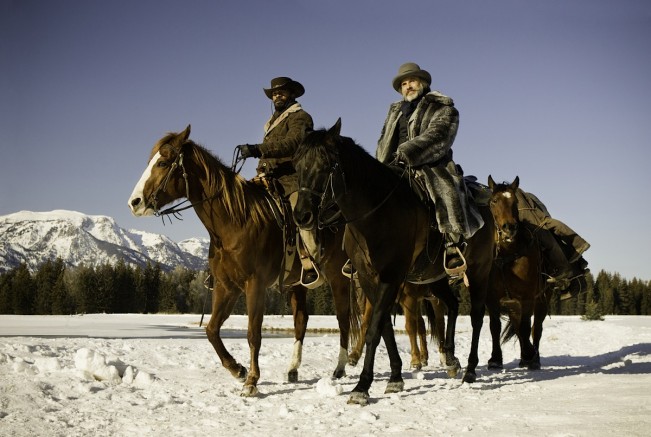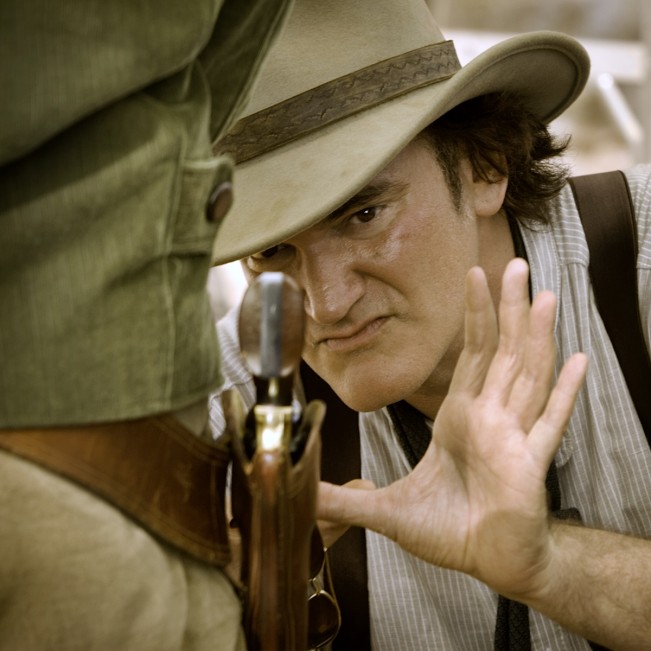
By Jake Howell jake.howell@utoronto.ca
The Torontonian Reviews: Django Unchained
 Riding up as the sunset of 2012 falls, Quentin Tarantino’s latest revenge narrative spurs another fire in the hearts of cinemagoers who have grown to love the director’s particular brand of raucous story-telling. Although boiled twenty minutes too long, this spaghetti Western is nonetheless thrilling, meaty, and immensely enjoyable. More importantly, in an awards season of stuffy biopics and middling Middle Eastern depictions–RIP, Edward Saïd–Django Unchained busts loose as the best film of the year.
Riding up as the sunset of 2012 falls, Quentin Tarantino’s latest revenge narrative spurs another fire in the hearts of cinemagoers who have grown to love the director’s particular brand of raucous story-telling. Although boiled twenty minutes too long, this spaghetti Western is nonetheless thrilling, meaty, and immensely enjoyable. More importantly, in an awards season of stuffy biopics and middling Middle Eastern depictions–RIP, Edward Saïd–Django Unchained busts loose as the best film of the year.
After an engrossing opening credits sequence–think vibrant title text with Luis Bacalov’s “Django” chanting over stereotypical Western backdrops–a shuffling line of slaves enter the frame, led like chattel by their masters on their way to Satan-knows-where. Moments later, bounty hunter Dr. King Schultz (Christoph Waltz) finds the caravan of slaves in a forest, where amongst them is our hero Django (Jamie Foxx), the only man who knows the location of Schultz’ next bounty. Finding they enjoy the company of one another, the pair team up as a wise-cracking, bounty-hunting duo of best friends, who after a successful winter of killing outlaws work out a strategy to rescue Django’s wife from a plantation owned by the ruthless Calvin Candie (Leonardo DiCaprio).
Tarantino once again plays with a mix of genres (the spaghetti Western, the romance, the comedy) but it should come as no surprise that the result is a glorious cocktail of love, swagger, and blood stains. But given the recent mass shootings in the United States (Aurora, Colorado, and Newtown, Connecticut, to name only two), audiences may find themselves uncomfortable with Django’s hyper-gore and fetishized gun violence. To this, I call upon the wise tweets of James Rocchi, who types: “Movie guns are images, not real guns”– a reassuring truth that, if necessary, will make the viewing experience of Django Unchained more enjoyable for the reality-conscious film-goer. This is comic violence, folks–it is bloody, pulpy fiction in a decades-old genre that is no stranger to destruction. Thankfully, for grindhouse nerds who dig the gross-out funnies of “splatstick” comedy, the genre tropes and Western settings serve as perfect carriers for Tarantino’s searing script and dark sense of humor.
Django Unchained is the funniest Quentin Tarantino film as well, which would suggest a new intention for the auteur. For a movie featuring the horrors of slavery as a prominent theme (and they are horrific, as the film has scenes to make us all cringe), it is surprising to see how many successful laughs there are. Of course, the humor is inevitable with another brilliant performance by Christoph Waltz, who steals every scene he’s in; serving as both the contemporary opinion of slavery (it is awful) and a reminder that the film is over-the-top (take a look at his horse and carriage). That’s not to say Waltz’s co-stars aren’t also hilarious–Foxx, DiCaprio, and yes, Samuel L. Jackson are each at the top of their game. Then again, this is not their first rodeo. (Also look for a particularly amazing scene featuring some bumbling Ku Klux Klan members, likely the funniest on-screen gag of the year.)
 One of the most salient aspects of any Tarantino film is its soundtrack, and Django’s catalogue is expectedly brimming with gorgeous ballads, bombastic show-stoppers, and all-out needle-droppers. Tarantino’s ability to marry pictures with sounds proves again to be masterful; producing results that induce a vibe of grin-worthy Zen. The aural and visual qualities of Django Unchained–when the film is not bogged down by the director’s lengthy monologues–fuse to make the darkened theater around you a temple of the senses, assuming you also have a bag of popcorn in your hands (you should). It’s downright hypnotizing.
One of the most salient aspects of any Tarantino film is its soundtrack, and Django’s catalogue is expectedly brimming with gorgeous ballads, bombastic show-stoppers, and all-out needle-droppers. Tarantino’s ability to marry pictures with sounds proves again to be masterful; producing results that induce a vibe of grin-worthy Zen. The aural and visual qualities of Django Unchained–when the film is not bogged down by the director’s lengthy monologues–fuse to make the darkened theater around you a temple of the senses, assuming you also have a bag of popcorn in your hands (you should). It’s downright hypnotizing.
The film is not without its faults–nothing this year is, it seems–but I will repeat myself a third time: this Western is long and undoubtedly could use some cutting. Still, Tarantino’s self-indulgence does not ruin the incendiary action, quotable one-liners, and outright panache that entertains like no other filmography. Django Unchained is absolutely the finest moviegoing experience you’ll have in a 2012 release: QT knows this, wants this, and lives for these types of movies himself. It is a celebration of cinema set in a time before cinema even existed.
Oh, and Spike Lee should see it.














Check out “Quentin Tarantino, Cinema’s Glourious Basterd.”